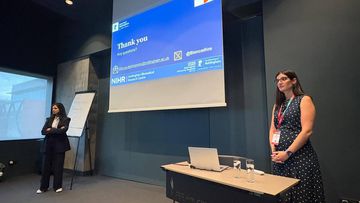More real people doing real things to make a difference to those with MS
NewsRaising the bar for MS: Past, present… Future
It's two weeks until the deadline for poster submissions for Raising the Bar 2020 and we need to hear your stories of how you have adapted or updated local services to support people during this last year.
So many ways of working have had to change, and standard service delivery models have had to fall by the wayside.
Some of the ways you have changed your working might be a real help to others facing the same challenges elsewhere - so please share your stories.
Please submit your story in a poster, video clip, slide, audio description, written document - whatever way you share information best.
Last year's posters can all be found online still, whilst some examples of great practice shared this year so far might further inspire you!

- Learning from experience: remote clinics
- Remote phlebotomy service
- Online Pilates encouraging self-management
- Virtual health and wellness clinics
Service evolution:
Learning from experience: remote clinics
Early on in the pandemic, experienced remote-practitioners were sharing their triumphs and pitfalls over the years so that the rest of us could hit the ground running.
Dr Brendan McLean in Cornwall and Dr Niall MacDougall in Scotland both talked to a webinar audience about how they have used remote clinics for years to support patients who live in harder to reach areas, such as the Scilly Isles and the Highland Islands.
Rachel Morrison, also based in the Highlands, won the 2019 Foundation MasterClass project award for her quality improvement project which married digital apps and personable support as a specialist nurse. The 'My MS Passport' project evaluated the personal, clinical and cost-effectiveness of a hand held, self-managed personal record for people living with MS over a four month period. The poster, highlighting brilliant outcomes in terms of self-management and empowerment, and noticeable physical, psychological and social benefits to the individuals involved, is in the MS Academy delegate project resources.

The three, also joined by Joela Mathews who discussed the possible future of home infusion services, discussed what they have learned over the years and how they are working now, in a helpful blueprint of a webinar - still available to listen back to.
Service evolution:
Remote phlebotomy services
NeuroResponse, a digital care model that gives people living with neurological conditions more control over the care they receive, was developed by MS specialist nurse Bernadette Porter.
This year, aware of the challenges in providing blood monitoring for people with MS on disease modifying therapies, NeuroResponse set up a short term remote phlebotomy service: NeuroResponse@Home.
NeuroResponse@Home was provided for a small number of Trusts in London to monitor patients being treated by Alemtuzumab. The service combines a secure online space where the individual's care plan is developed with their consultant neurologist. Combining a home phlebotomist visit with NeuroResponse technology, same day blood processing and liaison with the individual's neurologist, the service allows for the safe monitoring of patients, away from a hospital setting, but in collaboration with their existing healthcare team.
Service evolution:
Online Pilates classes encourage self-management and moving well
Neuro-physiotherapist Rachel Changer has been holding virtual Pilates classes throughout the year in lockdown, helping people with MS to move better. Pilates as a discipline also encourages class attendees to listen to their bodies and engage with their own needs, which in turn encourages self-awareness and self-management.
We interviewed Rachel this week on why Pilates is such a good fit for MS. She also shared how, as a movement discipline, it's a great fit for remote classes, as it relies heavily on verbal cues and the individual's own awareness of their body.
Our healthy lifestyle workstream resources also list a number of free online Pilates videos taught by neuro-physiotherapists such as these by Claire Salisbury, which can be shared with patients for use in their own time, or used in conjunction with remote clinics where appropriate.
Service evolution:
Virtual health and wellness clinics
Consultant neurologist Agne Straukiene has been holding health and wellness clinics for people with MS in Torquay and the surrounding area for the past few years, and is keen to encourage others to do the same.
The healthy lifestyle workstream within Raising the Bar, which Agne leads, has been developing resources for both clinicians and people with MS, to encourage clinicians to support self-management in their patients.
The latest resource is an online 'disease-modifying lifestyle' clinic, comprising resources, a letter to patients, and a pre-recorded clinic session, so that other clinicians can hold their own clinics virtually. The goal: to share information, encourage self-management and generally inspire healthier life choices, leading to people living their best lives with MS.
Related articles
Encouraging excellence, developing leaders, inspiring change
MS Academy was established in 2016 and in that time has accomplished a huge amount with exciting feedback demonstrating delegates feel inspired and energised along their personal and service development journeys. The various different levels of specialist MS training we offer are dedicated to case-based learning and practical application of cutting edge research.


